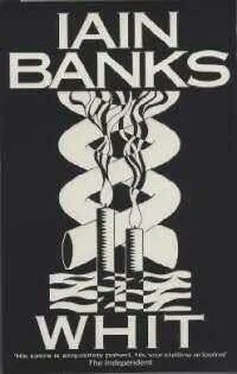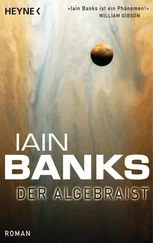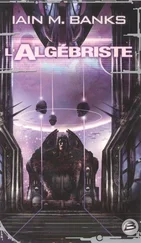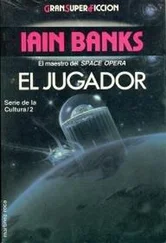There was a silence. Then she muttered something in what I suspected was Khalmakistani. Then, in English: 'You're not little Isis. She's just… little.'
Oh, good grief. 'Grand-aunt, I am nineteen years old now. The last time you saw me I was little. But I'm not any more; I am a fully grown woman.'
'Are you sure?'
'What?'
'You're not a ghost?'
'No. I mean, yes, I'm sure I'm not a ghost. I am real. I would like to talk with you, if you don't mind. I'm sorry I had to hide in here in order to get to see you, but the young lady would not let me in…. May I talk with you?'
'Talk with me?'
'Please. May I?'
'Hmm,' she said. I sensed her moving. 'Touch my hand.'
I moved forward, then squatted near the bed and put out my hand, eventually finding her hand. It felt warm and small. The skin was loose and very soft and smooth.
'Oh,' she whispered. 'You're warm!'
'See? Not a ghost.'
'Yes. I see. You're not a ghost, are you?'
'No. I'm real. I'm Isis.'
'Little Isis.'
'Not little any more.' I stood up, slowly, still holding her hand, then squatted again.
'Are you really Isis?'
'Yes. Isis Whit. I was born on the twenty-ninth of February, nineteen seventy-six. My mother was Alice Cristofiori, my father was Christopher Whit. My brother's first name is Allan. You are my Great-aunt Zhobelia Asis; your sister was Aasni, who…' I had been going to say, 'who died in the fire that killed my parents', but I thought the better of saying that, and after a moment's hesitation said, '… who was my paternal grandmother.'
She was silent.
'Believe me now?' I asked, squeezing her hand gently.
'I think so. Why are you here? Have they sent you away too? I thought here was only for old people.'
'Well, yes, I suppose I have been sent away, but not to here. I came here to see you.'
'You did? That was very nice of you. Mohammed comes to see me sometimes, but not very often. He drinks, you know. The girls have been; Calli and Astar. And the Glasgow ones; they talk the old language. I can't understand them, usually. I keep telling them they must talk slower but they don't listen. People never listen, you know. Especially young people.'
'I'll listen, Great-aunt.'
'Will you? You're a good girl. You were very good as a baby; you hardly cried, did you know that?'
'Other people have-'
'Are you really Isis?'
'… Yes, Great-aunt.'
She was silent for a long moment. 'I missed you growing up,' she said, though without obvious emotion, unless it was mild surprise. I wished I could see her face.
'I was sorry you went away,' I told her. 'I think we all were.'
'I know. Perhaps I shouldn't have. This is very strange, talking to you like this. What do you look like? Shall we put on the light?'
'Won't the nurse see the light is on?'
'Yes. She can see it under the door.'
'I have an idea,' I said, patting her hand.
Zhobelia's clothes had been laid neatly on the bed I had been hiding under. I moved them to the top of the chest of drawers and pulled the cover off the bed. I rolled it up and placed it at the foot of the door.
'Here,' Zhobelia said, grunting. There was a click, and a little yellow electric lamp like a miniature strip-light came on above the bed. I stood up, smiling at my great-aunt. She sat up in the bed, blinking. Her nightie was pale blue, with little yellow flowers. She looked a little puffy and pale about the face, not as Asiatically dark as I remembered. Her hair was frizzy, quite long and still surprisingly black, though shot through with thick, crinkly white hairs. She felt on the bedside table and found her glasses. She put them on and squinted at me.
The room seemed to spin about me as the feeling of half-familiar dizziness I'd experienced earlier struck me again.
Zhobelia seemed oblivious. 'You look like your mother,' she said quietly, nodding. She patted the bed. 'Come and sit here.'
I went shakily forward and sat on the bed; we held hands.
'Why did you leave, Great-aunt?'
'Oh, because I couldn't stay.'
'But why?'
'It was the fire.'
'It was terrible, I know, but-'
'Do you remember it?'
'Not really. I remember the aftermath; the shell of the mansion house. It's been rebuilt now.'
'Yes, I know.' She nodded, blinking. 'Good. I'm glad.'
'But why did you leave, afterwards?'
'I was afraid people would blame me. I was afraid of Aasni's ghost. Besides, I'd done my bit.'
'Blame you? For what? The fire?'
'Yes.'
'But it wasn't your fault.'
'It was. I should have cleaned the pressure cooker. And burning the money was my idea; I saw it, after all. My fault.'
'But you weren't - pardon?'
'The pressure cooker. I should have cleaned it properly. The valve. That was my job. And I saw the money would cause a disaster. I knew it.'
'What money were you talking about?'
She looked as confused as I felt. Her eyes - their dark brown irises surrounded by yellowy whites magnified by her thick glasses - looked watery. 'Money?' she asked.
'You said burning the money was your idea.'
'It was,' she said, nodding.
'What money, Great-aunt?' I asked, squeezing her hand gently.
'The money. Salvador's money.'
' Salvador's money ?' I asked, then glanced back at the door, afraid that I had spoken too loudly.
'The money he didn't have,' Zhobelia said, as though all this made perfect and obvious sense.
'What money he didn't have, Great-aunt?' I asked patiently.
'The money,' she said, as though it ought to be self-evident.
'I'm sorry, Great-aunt; I don't understand.'
'Nobody understood. We kept it secret,' she said, then turned down the edges of her mouth and shook her head, looking away. Suddenly a smile lit up her face, revealing long, thin teeth. She patted my hand. 'Now, tell me all that's happened.'
I took a deep breath. Perhaps we could come back to this mysterious money later. 'Well,' I said. 'When… when did you last talk to somebody from the Community? Was it recently?'
'Oh no,' she said. 'I mean, since I had to leave. I can't remember what they've said to me. No, no.' She frowned a little and gave the appearance of racking her brains, then apparently gave up and smiled broadly, expectantly at me.
It felt as though my heart slumped at the prospect, but I smiled gamely and squeezed her hand again. 'Let me see,' I said. 'Well, as I said, the mansion house was rebuilt… the old organ - remember the organ, in the farm parlour?'
She smiled happily and nodded. 'Yes, yes; go on.'
'That was installed in the mansion house to give us extra room in the farm; we always meant to have it properly looked after but we never did get round to it… Anyway, Salvador moved back into the mansion house… let's see; Astar had Pan, of course, Erin had Diana-'
'I'm cold,' Zhobelia said suddenly. 'I'd like my cardie.' She pointed at the pile of clothes on the chest of drawers. 'It's there.'
'Oh, right,' I said. I got her cardigan and settled it round her shoulders, plumping up her pillows and generally getting her comfortable.
'There we are,' she said. 'Now.' She clasped her hands and looked expectantly at me.
'Right,' I said. 'Well, as I was saying, Erin had her second child, Diana…'
I went through the litany of births, death and marriages and the various comings and goings of Communites and Orderites, trying to recall all the important incidents and events of the past sixteen years. Zhobelia sat nodding happily, smiling and cooing softly or widening her eyes and sucking air in through her pursed mouth or frowning and clucking her tongue as she felt appropriate for each related occurrence.
The story of our family and Faith led me naturally through to more recent events, and I gradually sharpened the focus of my tale to the point of my visit. I had little idea of how much my great-aunt was actually retaining of all this, but I felt I had to make the effort.
Читать дальше












